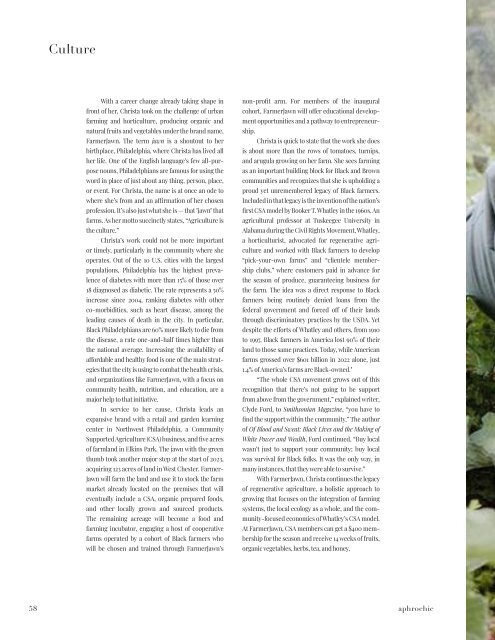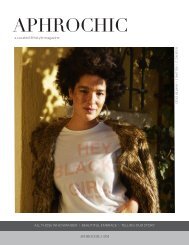AphroChic Magazine: Issue No. 12
Create successful ePaper yourself
Turn your PDF publications into a flip-book with our unique Google optimized e-Paper software.
Culture<br />
With a career change already taking shape in<br />
front of her, Christa took on the challenge of urban<br />
farming and horticulture, producing organic and<br />
natural fruits and vegetables under the brand name,<br />
FarmerJawn. The term jawn is a shoutout to her<br />
birthplace, Philadelphia, where Christa has lived all<br />
her life. One of the English language’s few all-purpose<br />
nouns, Philadelphians are famous for using the<br />
word in place of just about any thing, person, place,<br />
or event. For Christa, the name is at once an ode to<br />
where she’s from and an affirmation of her chosen<br />
profession. It’s also just what she is — that "jawn" that<br />
farms. As her motto succinctly states, “Agriculture is<br />
the culture.”<br />
Christa’s work could not be more important<br />
or timely, particularly in the community where she<br />
operates. Out of the 10 U.S. cities with the largest<br />
populations, Philadelphia has the highest prevalence<br />
of diabetes with more than 15% of those over<br />
18 diagnosed as diabetic. The rate represents a 50%<br />
increase since 2004, ranking diabetes with other<br />
co-morbidities, such as heart disease, among the<br />
leading causes of death in the city. In particular,<br />
Black Philadelphians are 60% more likely to die from<br />
the disease, a rate one-and-half times higher than<br />
the national average. Increasing the availability of<br />
affordable and healthy food is one of the main strategies<br />
that the city is using to combat the health crisis,<br />
and organizations like FarmerJawn, with a focus on<br />
community health, nutrition, and education, are a<br />
major help to that initiative.<br />
In service to her cause, Christa leads an<br />
expansive brand with a retail and garden learning<br />
center in <strong>No</strong>rthwest Philadelphia, a Community<br />
Supported Agriculture (CSA) business, and five acres<br />
of farmland in Elkins Park. The jawn with the green<br />
thumb took another major step at the start of 2023,<br />
acquiring <strong>12</strong>3 acres of land in West Chester. Farmer-<br />
Jawn will farm the land and use it to stock the farm<br />
market already located on the premises that will<br />
eventually include a CSA, organic prepared foods,<br />
and other locally grown and sourced products.<br />
The remaining acreage will become a food and<br />
farming incubator, engaging a host of cooperative<br />
farms operated by a cohort of Black farmers who<br />
will be chosen and trained through FarmerJawn’s<br />
non-profit arm. For members of the inaugural<br />
cohort, FarmerJawn will offer educational development<br />
opportunities and a pathway to entrepreneurship.<br />
Christa is quick to state that the work she does<br />
is about more than the rows of tomatoes, turnips,<br />
and arugula growing on her farm. She sees farming<br />
as an important building block for Black and Brown<br />
communities and recognizes that she is upholding a<br />
proud yet unremembered legacy of Black farmers.<br />
Included in that legacy is the invention of the nation’s<br />
first CSA model by Booker T. Whatley in the 1960s. An<br />
agricultural professor at Tuskeegee University in<br />
Alabama during the Civil Rights Movement, Whatley,<br />
a horticulturist, advocated for regenerative agriculture<br />
and worked with Black farmers to develop<br />
“pick-your-own farms” and “clientele membership<br />
clubs,” where customers paid in advance for<br />
the season of produce, guaranteeing business for<br />
the farm. The idea was a direct response to Black<br />
farmers being routinely denied loans from the<br />
federal government and forced off of their lands<br />
through discriminatory practices by the USDA. Yet<br />
despite the efforts of Whatley and others, from 1910<br />
to 1997, Black farmers in America lost 90% of their<br />
land to those same practices. Today, while American<br />
farms grossed over $601 billion in 2022 alone, just<br />
1.4% of America’s farms are Black-owned."<br />
“The whole CSA movement grows out of this<br />
recognition that there’s not going to be support<br />
from above from the government,” explained writer,<br />
Clyde Ford, to Smithsonian <strong>Magazine</strong>, “you have to<br />
find the support within the community,” The author<br />
of Of Blood and Sweat: Black Lives and the Making of<br />
White Power and Wealth, Ford continued, “Buy local<br />
wasn’t just to support your community; buy local<br />
was survival for Black folks. It was the only way, in<br />
many instances, that they were able to survive.”<br />
With FarmerJawn, Christa continues the legacy<br />
of regenerative agriculture, a holistic approach to<br />
growing that focuses on the integration of farming<br />
systems, the local ecology as a whole, and the community-focused<br />
economics of Whatley’s CSA model.<br />
At FarmerJawn, CSA members can get a $400 membership<br />
for the season and receive 14 weeks of fruits,<br />
organic vegetables, herbs, tea, and honey.<br />
58 aphrochic

















